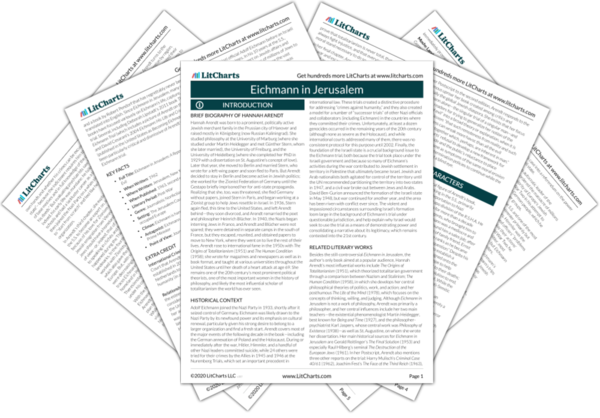David Ben-Gurion Quotes in Eichmann in Jerusalem
In this respect, perhaps even more significantly than in others, the deliberate attempt at the trial to tell only the Jewish side of the story distorted the truth, even the Jewish truth. The glory of the uprising in the Warsaw ghetto and the heroism of the few others who fought back lay precisely in their having refused the comparatively easy death the Nazis offered them—before the firing squad or in the gas chamber. And the witnesses in Jerusalem who testified to resistance and rebellion, to “the small place [it had] in the history of the holocaust,” confirmed once more the fact that only the very young had been capable of taking “the decision that we cannot go and be slaughtered like sheep.”

Unlock explanations and citation info for this and every other Eichmann in Jerusalem quote.
Plus so much more...
Get LitCharts A+In other words, and despite pages and pages of legal argument, based on so many precedents that one finally got the impression that kidnaping was among the most frequent modes of arrest, it was Eichmann’s de facto statelessness, and nothing else, that enabled the Jerusalem court to sit in judgment on him. Eichmann, though no legal expert, should have been able to appreciate that, for he knew from his own career that one could do as one pleased only with stateless people; the Jews had had to lose their nationality before they could be exterminated.
In the eyes of the Jews, thinking exclusively in terms of their own history, the catastrophe that had befallen them under Hitler, in which a third of the people perished, appeared not as the most recent of crimes, the unprecedented crime of genocide, but, on the contrary, as the oldest crime they knew and remembered. This misunderstanding, almost inevitable if we consider not only the facts of Jewish history but also, and more important, the current Jewish historical self-understanding, is actually at the root of all the failures and shortcomings of the Jerusalem trial. None of the participants ever arrived at a clear understanding of the actual horror of Auschwitz, which is of a different nature from all the atrocities of the past, because it appeared to prosecution and judges alike as not much more than the most horrible pogrom in Jewish history. They therefore believed that a direct line existed from the early anti-Semitism of the Nazi Party to the Nuremberg Laws and from there to the expulsion of Jews from the Reich and, finally, to the gas chambers. Politically and legally, however, these were “crimes” different not only in degree of seriousness but in essence.

David Ben-Gurion Quotes in Eichmann in Jerusalem
In this respect, perhaps even more significantly than in others, the deliberate attempt at the trial to tell only the Jewish side of the story distorted the truth, even the Jewish truth. The glory of the uprising in the Warsaw ghetto and the heroism of the few others who fought back lay precisely in their having refused the comparatively easy death the Nazis offered them—before the firing squad or in the gas chamber. And the witnesses in Jerusalem who testified to resistance and rebellion, to “the small place [it had] in the history of the holocaust,” confirmed once more the fact that only the very young had been capable of taking “the decision that we cannot go and be slaughtered like sheep.”

Unlock explanations and citation info for this and every other Eichmann in Jerusalem quote.
Plus so much more...
Get LitCharts A+In other words, and despite pages and pages of legal argument, based on so many precedents that one finally got the impression that kidnaping was among the most frequent modes of arrest, it was Eichmann’s de facto statelessness, and nothing else, that enabled the Jerusalem court to sit in judgment on him. Eichmann, though no legal expert, should have been able to appreciate that, for he knew from his own career that one could do as one pleased only with stateless people; the Jews had had to lose their nationality before they could be exterminated.
In the eyes of the Jews, thinking exclusively in terms of their own history, the catastrophe that had befallen them under Hitler, in which a third of the people perished, appeared not as the most recent of crimes, the unprecedented crime of genocide, but, on the contrary, as the oldest crime they knew and remembered. This misunderstanding, almost inevitable if we consider not only the facts of Jewish history but also, and more important, the current Jewish historical self-understanding, is actually at the root of all the failures and shortcomings of the Jerusalem trial. None of the participants ever arrived at a clear understanding of the actual horror of Auschwitz, which is of a different nature from all the atrocities of the past, because it appeared to prosecution and judges alike as not much more than the most horrible pogrom in Jewish history. They therefore believed that a direct line existed from the early anti-Semitism of the Nazi Party to the Nuremberg Laws and from there to the expulsion of Jews from the Reich and, finally, to the gas chambers. Politically and legally, however, these were “crimes” different not only in degree of seriousness but in essence.











